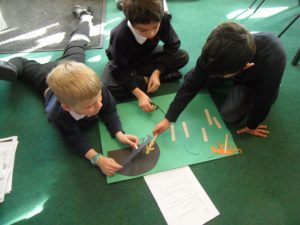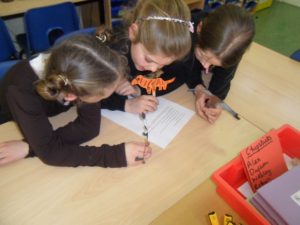A Brighton primary school has been rated good by Ofsted after its first inspection for four years.
Rudyard Kipling Primary School and Nursery head Joanne Smith wrote to parents on Friday (9 June) and said: “We are delighted to be able to share our recent Ofsted report with everyone following our inspection at the beginning of May.
“It feels like a long time ago but we are thrilled to confirm that Ofsted continue to judge Rudyard Kipling as a good school.”
Ofsted inspector Julie Sackett wrote to Mrs Smith to set out her findings after visiting the school, in Chalkland Rise, Woodingdean.
She said: “The leadership team has maintained the good quality of education in the school since the last inspection.
“You have worked very effectively with your school team to improve the quality of teaching since your appointment in September 2015.
“You have steered the school through an unsettled time, including numerous changes in staffing. The school is now benefiting from a more settled phase.
“Teachers are committed to playing their part in raising standards and staff morale is high.
“Most parents are pleased with the school. They say their children are happy in school and that teachers listen carefully to what parents have to say.
“You and your team responded quickly to weaker writing outcomes at the end of key stage 1 in 2016 and a dip in the Year 1 phonics check results.
“You have made substantial improvements to the quality of teaching in these subjects during the past year.
“As a result, pupils are more securely equipped with key reading and writing skills than previously.
“You have strengthened the school’s capacity to secure further improvements by making some significant appointments to the leadership team, including the appointment of key stage leaders and subject leaders.
“Your leaders share the same high expectations of staff and pupils and provide strong role models for their colleagues.
“They work constructively with teachers, checking pupils’ learning and providing clear, consistent advice about what teachers can do to develop their practice.
“You and your team are determined to ensure that all pupils do their best and achieve well, regardless of their background or ability.
“Skilful teaching, including specialist support provided in your school’s ‘nurture room’, ensures that all groups of pupils make equally good progress, including disadvantaged pupils and those who have special educational needs and/or disabilities.
“However, teaching is not yet sufficiently strong across the school to deepen and extend pupils’ understanding fully enough in mathematics. As a result, some pupils do not achieve as well as they should in this subject.
“Pupils thoroughly enjoy welcoming visitors and are understandably proud of their school. They get on well together and respect the views of others. They move around school sensibly and behave well during lessons.
“Pupils’ good behaviour makes a strong contribution to the quality of their learning and to their progress over time.
“However, some pupils do not behave as well as they should in the playground during the lunchtime break.
“You and your leaders have already identified this aspect of the school’s work as a priority for development and have made a good start in improving pupils’ behaviour during lunchtime.
“For example, you have introduced a range of playground activities which help to make the lunchtime break more purposeful and fun. However, you recognise that more needs to be done.
“You have suitable plans in place, including further training to develop adults’ expertise in supporting pupils’ behaviour.
“Governance has improved since the previous inspection. For example, governors come into school to meet and work with members of staff more frequently than before and so have a much clearer view of the school’s performance.
“They challenge leaders effectively by asking searching questions about the quality of teaching and learning.
“Governors appreciate your honest, open and professional approach to leading the school.
“One governor commented on improvements in teamwork since you were appointed, saying, ‘Everyone listens – at all levels and across the school.’
“You have addressed the issues for improvement identified at the time of the previous inspection effectively by improving the quality of teaching and learning across the school. Pupils learn increasingly well as a result, particularly during key stage 1.
“Safeguarding is effective. You, your staff and your governors give pupils’ safety an appropriately high priority.
“You and your team ensure that all safeguarding arrangements are fit for purpose and that records are of high quality and detailed.
“You make sure safeguarding policies are regularly updated so that your team members are clear about the steps they should take if they have a concern.
“You make good use of training to ensure that staff and governors have a confident and up-to-date knowledge of safeguarding requirements and procedures.
“Your recently appointed business manager has made a good start by familiarising himself with the school’s safeguarding procedures and by checking that records are complete.
“At the time of my visit, technical difficulties meant that some aspects of the safeguarding documents on the school’s website were out of date.
“However, you are well aware of the issue and continue to work with the website provider to make sure key information is updated and accessible.
“Pupils say they feel safe and secure in school.”
The inspector also said: “The school’s increasing success in supporting vulnerable pupils in school is reflected in a reduction in exclusions in the past two years.
“Leaders expect all pupils, regardless of background or ability, to attend regularly, so that they can achieve well.
“They keep a careful watch on pupils’ attendance throughout the year, following up on poor or unexplained absence rigorously.
“Leaders are determined to ensure that all pupils attend regularly and continue to work with parents to ensure that this is the case.
“Pupils’ books are brimming with good-quality and carefully presented written work. All groups of pupils make good progress during key stage 1, including disadvantaged pupils and the most able. Improvements in teaching mean that standards are rising.”
The inspector added: “Leaders and those responsible for governance should ensure that teaching deepens and extends pupils’ mathematical understanding more effectively (and) pupils’ behaviour during the lunchtime break is the same high quality as their behaviour during lessons.”












